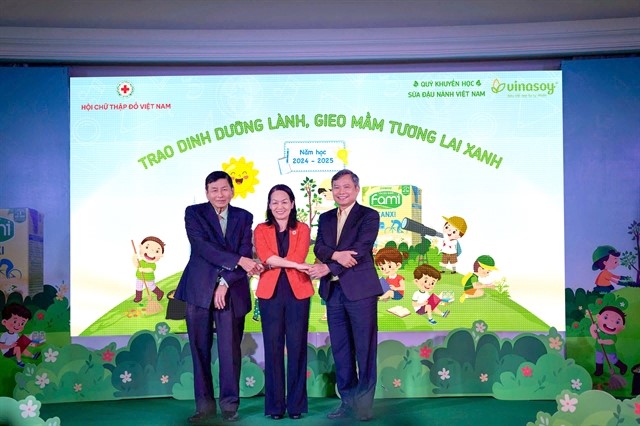The Vietnam Soymilk Study Promotion Fund and Vinasoy have collaborated with the Vietnam Red Cross Society to launch the "School Soymilk" programme for the 2024-25 school year.

The Vietnam Soymilk Study Promotion Fund and Vinasoy have collaborated with the Vietnam Red Cross Society to launch the "School Soymilk" programme for the 2024-25 school year.
This marks the ninth consecutive year of the programme, continuing its mission of providing healthy plant-based nutrition to underprivileged students.
In the 2024-25 school year, the programme will donate over 755,000 cartons of Fami soymilk, worth nearly VNĐ3.44 billion (US$137,357) to elementary students in schools across Quảng Ngãi, Lao Cai, and Yên Bái provinces.
In Quảng Ngãi alone, the programme will supply 264,840 cartons of Fami soymilk, valued at more than VNĐ1.2 billion ($48,016) to 10 elementary schools in the districts of Trà Bồng and Sơn Tây.
Since 2016, the "School Soymilk" programme, carried out by the Vietnam Soymilk Study Promotion Fund and Vinasoy, has provided nearly 12.6 million cartons of Fami soymilk worth a total of VNĐ45.1 billion ($1.8 million) to over 886,000 students across 1,580 schools in 19 remote provinces.
With the message “Nurturing Health, Growing a Greener Future”, this year’s programme aims not only to improve school health but also to foster environmental awareness among students. Practical lessons on sorting and recycling milk cartons will inspire students to understand that protecting the environment starts with small actions and is the responsibility of every individual.
At the ceremony, Vinasoy also awarded scholarships to 10 outstanding underprivileged students in Quảng Ngãi.
Bùi Thị Hòa, president of the Vietnam Red Cross Society, said: “The Vietnam Red Cross Society is committed to accompanying and collaborating to deliver the healthy nutrition of soymilk to students in the safest and most effective way. Our collective efforts will create a powerful impact, not only providing tangible benefits to students but also contributing to a sustainable and healthy nutritional foundation for future generations.”— VNS





